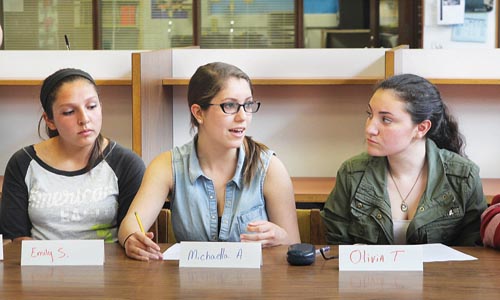SWR teacher flips script with Socratic seminars

More than 30 Shoreham-Wading River High School students took over an after-school classroom discussion earlier this month. As English teacher John Mitchell looked on, listening closely, the teenagers took turns debating among themselves the meaning of a letter Dr. Martin Luther King Jr. wrote from a Birmingham, Ala., jail. But it wasn’t an act of mutiny or disobedience on their part.
Earlier, Mr. Mitchell had written a list of concepts on an easel: morality, law, power, liberty, religion, dignity, justice, politics, suffrage, democracy, equality, responsibility, society and civil disobedience. The only direction he gave his group was to read Dr. King’s letter, identify which of the concepts listed were addressed in the text, and where, and decide their order of importance.
No need for the students to raise their hands before speaking; the teacher gave them permission to take turns stating their opinions among themselves. Most spoke to each other directly, instead of addressing Mr. Mitchell.
“I think that morality is number one,” 10th-grader Michaella Aliperti said to her peers as a dozen educators and administrators eavesdropped from the room’s outskirts. “Law is important. You can get into a lot of trouble when you don’t obey it, but when it’s morally wrong you have to take a stand in order to get rid of it.”
Fellow student William Adote disagreed about which concept should be ranked first.
“I feel dignity is very important to this piece,” he said. “If Martin Luther King Jr. didn’t think that Negroes had dignity, I don’t believe he would have been as encouraged to fight and take action.”
Mr. Mitchell’s May 8 discussion was intended to demonstrate a “Socratic seminar” for fellow educators, so that they can incorporate the teaching technique in their own classrooms. The Socratic style differs from a typical lecture because it involves creating an open forum for students to share ideas and discuss opinions with very little input from the teacher. “I try not to say anything,” Mr. Mitchell said in an interview after the seminar. “I usually explain to them why I don’t talk. It’s their forum. We also encourage them to address one another. When they first start doing Socratic seminars, they always look straight at the teacher.”
Although students direct the discussion in these seminars, Mr. Mitchell said his role is to encourage shy students to express their opinions.
During the recent seminar, for example, he noticed that junior Francesca Varuolo wanted to say something during the debate about dignity, but she held back.
After some coaxing from Mr. Mitchell, she finally said, “If you just go along with what society thinks, then you don’t really have a sense of dignity.”
“I like where you’re going,” the teacher replied.
Mr. Mitchell explained later that he’d invited Francesca into the discussion because he picked up on her body language.
“She was leaning forward and pointing to something in the text,” he said. “You can tell she wanted to speak. I invited her in and then other students invited others in. That’s the best, when students invite each other in.”
In addition to working with the new teaching model, Mr. Mitchell said he collaborates regularly with other high school teachers to share ideas as part of their professional development.
School officials have said they believe efforts of this type will help teachers receive top ratings in the state-mandated annual professional performance review plan, or APPR. The teacher evaluation requirement originated in 2010 after New York State received a grant of nearly $700 million under the federal Race to the Top program. The state now requires school districts to implement their own APPR programs in order to qualify for a portion of that grant money.
The state later approved legislation requiring school districts to replace their two-tier teacher evaluation system — satisfactory or unsatisfactory — with a four-tier rating structure that identifies each teach as highly effective, effective, developing or ineffective. A mathematical formula combines observations from the principal with student assessments to determine a teacher’s score.
Mr. Mitchell said that because Socratic seminars give students the opportunity to direct the learning process, this type of approach will help teachers achieve a “highly effective” ranking in the state’s eyes.
Students are tested on the seminar material by writing “reflection papers” in which they discuss the seminar process and what they thought some of the students’ key points were. They’re also asked to address a specific argument someone made and explain whether they agree or disagree with it, Mr. Mitchell said.
What he enjoys most about the seminars is that they encourage students to work through the material themselves, rather than simply being told answers and repeating them back.
“The kids are thinking in their heads, ‘Which one was [the correct answer]?’” Mr. Mitchell said after the seminar. “They’re still debating it right now as they walk away.”








